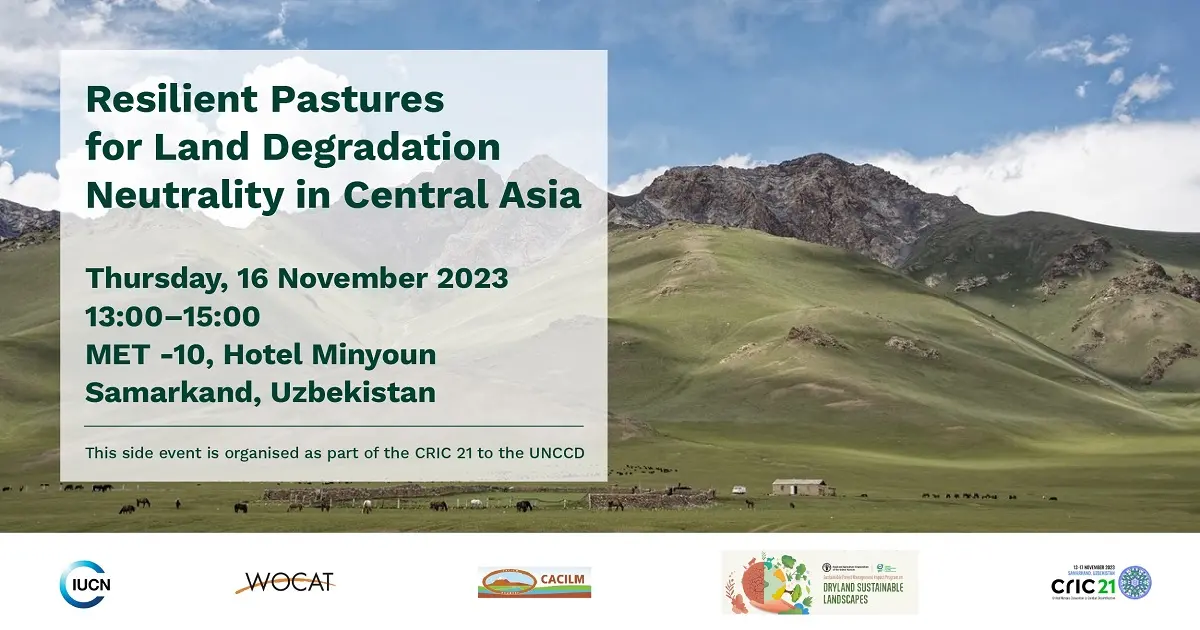Resilient Pastures for Land Degradation Neutrality in Central Asia / Side Event CRIC 21
A multi-stakeholder regional dialogue among governmental bodies, civil society organizations, academics, and private sector with the aim to collaboratively identify and scale up innovative, sustainable pasture management practices and strategies in Central Asia, thereby contributing to the 3 Rio Conventions, notably UNCCD's overarching goals of land degradation neutrality.

Photo: IUCN ECARO
Central Asia is particularly susceptible to drought, land degradation and desertification due to its arid climate, limited water resources and fragile vegetation cover. Overgrazing, deforestation, changes in land use and improper irrigation methods have led to soil erosion, reduced soil fertility, and the depletion of groundwater resources. Land degradation in Central Asia has multifaceted socio-economic and environmental impacts, affecting livelihoods, food security and ecosystem resilience and unsustainable practices such as overgrazing exacerbate soil erosion and land degradation overall. In economic terms, land degradation costs in Central Asia span from 3% to 11% of GDP with the cost of inaction being five times higher than the cost of action.
This Side Event proposes a constructive, multi-stakeholder dialogue
By facilitating this collaborative effort, the Side Event aims to fill knowledge gaps, catalyse innovations, promote cross-learning
Learning outcomes:
- Gain an understanding of the role of pastures from an ecological, economical, and social perspective.
- Identify policy gaps, conflicting interests, and administrative hurdles that impede sustainable pasture management.
- Discuss legislative frameworks, incentives, and governance structures that facilitate sustainable pasture management, including gender mainstreaming-related policies.
- Discuss existing public and private financing mechanisms and how they can be tailored for sustainable pasture initiatives.
-
Local time
Session name and description
Speakers
12:45-13:00
Welcome coffee and registration
13:00-13:10
Official opening
Abduvokhid Zakhadullaev,
Head of Unit, Ministry of ecology, environmental protection and climate change Republic of Uzbekistan (TBC)Chris Magero, Senior programme Officer, IUCN
13:10-13:45
The Role and value of Pastures: Ecological, Economical, and Social Perspectives Akmal Akramkhanov, Senior Scientist, ICARDA, Uzbekistan
Dr. Abdulla Rabbimov, MoA's research Institution, CACILM 2
13:45-14:00
Q&A session
14:00-14:50
Policy and Finance Landscape for Sustainable Pasture Management
Liubov Timofeeva, NbS Project Officer, IUCN ECARO
Aziz Nurbekov, FAO Uzbekistan
Mr. Temirzhanov, Ministry of Agriculture / UNCCD Focal Point, Kazakhstan TBC
Mrs. Ariuntuya Dorjsuren, Senior specialist of Foreign cooperation department, representing UNCCD Focal Point, Mongolia
Mr Rysbek Asapov, Ministry of Agriculture/ UNCCD Focal Point a.i., Kyrgyzstan
TBC Ministry of Environment / UNCCD Focal Point, Uzbekistan
Chris Magero, Senior Programme Officer, Forests and Grassland Team, IUCN
14:50-15:00
Wrap-up and final remarks
